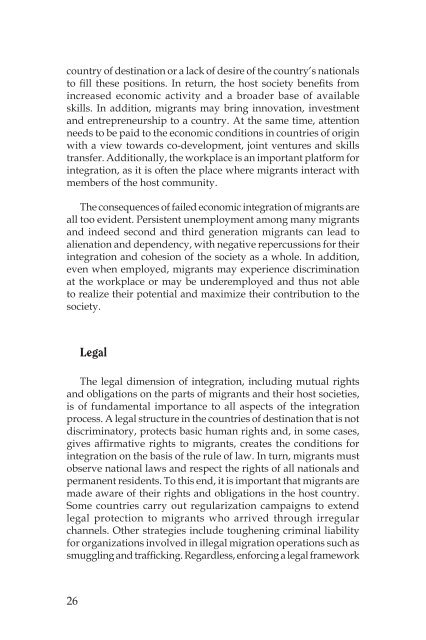Link - IOM Publications - International Organization for Migration
Link - IOM Publications - International Organization for Migration
Link - IOM Publications - International Organization for Migration
Create successful ePaper yourself
Turn your PDF publications into a flip-book with our unique Google optimized e-Paper software.
country of destination or a lack of desire of the country’s nationals<br />
to fill these positions. In return, the host society benefits from<br />
increased economic activity and a broader base of available<br />
skills. In addition, migrants may bring innovation, investment<br />
and entrepreneurship to a country. At the same time, attention<br />
needs to be paid to the economic conditions in countries of origin<br />
with a view towards co-development, joint ventures and skills<br />
transfer. Additionally, the workplace is an important plat<strong>for</strong>m <strong>for</strong><br />
integration, as it is often the place where migrants interact with<br />
members of the host community.<br />
The consequences of failed economic integration of migrants are<br />
all too evident. Persistent unemployment among many migrants<br />
and indeed second and third generation migrants can lead to<br />
alienation and dependency, with negative repercussions <strong>for</strong> their<br />
integration and cohesion of the society as a whole. In addition,<br />
even when employed, migrants may experience discrimination<br />
at the workplace or may be underemployed and thus not able<br />
to realize their potential and maximize their contribution to the<br />
society.<br />
26<br />
Legal<br />
The legal dimension of integration, including mutual rights<br />
and obligations on the parts of migrants and their host societies,<br />
is of fundamental importance to all aspects of the integration<br />
process. A legal structure in the countries of destination that is not<br />
discriminatory, protects basic human rights and, in some cases,<br />
gives affirmative rights to migrants, creates the conditions <strong>for</strong><br />
integration on the basis of the rule of law. In turn, migrants must<br />
observe national laws and respect the rights of all nationals and<br />
permanent residents. To this end, it is important that migrants are<br />
made aware of their rights and obligations in the host country.<br />
Some countries carry out regularization campaigns to extend<br />
legal protection to migrants who arrived through irregular<br />
channels. Other strategies include toughening criminal liability<br />
<strong>for</strong> organizations involved in illegal migration operations such as<br />
smuggling and trafficking. Regardless, en<strong>for</strong>cing a legal framework

















